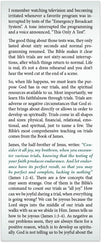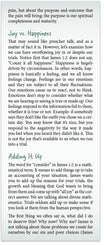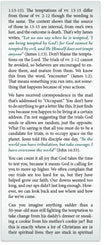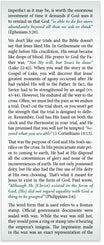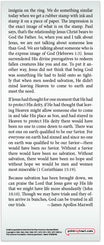Trusting God in Your Trials
Special-Order Folded Flyer Tract
 NOTE: This item is custom-printed to order (click for more details).
NOTE: This item is custom-printed to order (click for more details).
This tract is from our print-on-demand library, and is not kept in stock. Select the options below, and we will custom-print a batch just for you. Because this item is custom-printed, you can add your custom imprint to the back page at no extra cost.
- Estimated shipping date: Thursday, March 26 (Click for more details)
- SKU:
- Discounts: Discount coupons do not apply to this item
- Format: Folded Flyer Tract
- Size: 3.5 inches x 8.5 inches
- Pages: 8
- Imprinting: Available with 3 lines of custom text
- Version: NASB
- Returns: Because this item is custom-printed to order, it cannot be returned.
Show all item details
The full text of this flyer tract is shown below in the NASB version. (Do you want to print this tract in a different version than the one listed? Contact us and let us know what you're looking for—we may be able to create the alternate version for you at no charge.)
The Positive Purpose of Trials
James 1:12-15
James is the kind of book that you ought to read standing up. It contains a ringing call for action, a plea for vital Christianity and a faith that demonstrates itself not in mere words, but in lifestyle. James is one of the most practical books of the Bible, teaching that faith without action is dead.
The book of James addresses temptation, hypocrisy, prejudice, how to deal with problems, deception, discipline, controlling the tongue, conflict, Godly wisdom, patience, priorities and faith.
I remember watching television and becoming irritated whenever a favorite program was interrupted by tests of the “Emergency Broadcast System”. A tone interrupted the programming and a voice announced, “This Only A Test”.
The good thing about those tests was, they only lasted about sixty seconds and normal programming resumed. The Bible makes it clear that life’s trials are not sixty-second interruptions, after which things return to normal. Life is real, it’s not a dress rehearsal and you don’t hear the word cut at the end of a scene.
So, when life happens, we must learn the purpose God has in our trials, and the spiritual resources available to us. Most importantly, we learn His faithfulness through trials. Trials are: adverse or negative circumstances that God either brings about directly or allows in order to develop us spiritually. Trials come in all shapes and sizes: physical, financial, relational, emotional, and spiritual, just to name a few. The Bible’s most comprehensive teaching on trials comes from the Book of James.
James, the half-brother of Jesus, writes: “Consider it all joy, my brethren, when you encounter various trials, knowing that the testing of your faith produces endurance. And let endurance have its perfect result, so that you may be perfect and complete, lacking in nothing” (James 1:2-4). There are a few concepts that may seem strange. One of them is the Bible’s command to count our trials as “all joy.” How can we be joyful during a trial, when everything is going wrong? We can be joyous because the Lord steps into the middle of our trials and walks with us as we abide in Him. James tells us how to be joyous (James 1:3-4). As negative as our problems seem, they are always there for a positive reason, which is to develop us spiritually. God is not telling us to be joyful about the pain, but about the purpose and outcome that the pain will bring; the purpose is our spiritual completeness and maturity.
Joy vs. Happiness
That may sound like preacher talk, and as a matter of fact it is. However, let’s examine how we can have overflowing joy in or despite our trials. Notice first that James 1:2 does not say, “Count it all happiness.” Happiness is largely driven by circumstances. In other words, happiness is basically a feeling, and we all know feelings change. Feelings are in our emotions and they are subject to all their fluctuations. Our emotions cause us to react, not to think. Emotions don’t stop to consider whether what we are hearing or seeing is true or made up. Our feelings respond to the information fed to them, whether it is true or not. Example: if somebody says they don’t like the outfit you chose on a certain day. You may know that it’s nice, but you respond to the negativity by the way it made you feel when you heard they didn’t like it. This is not the joy that’s available to us when we run into a trial.
Adding It Up
The word for “consider” in James 1:2 is a mathematical term. It means to add things up to take an accounting of your situation. James wants you to add up the reasons for your trials, the growth and blessing that God wants to bring from them and come up with “all joy” as the correct answer. We are talking about divine mathematics. Trials seldom add up or make sense if you look at them from the human perspective.
The first thing we often say is, what did I do to deserve this? Why now? Why me? James is not talking about those problems we create for ourselves by our sin and poor choices (James 1:13-15). The temptations of vv. 13-15 differ from those of vv. 2-12 though the wording is the same. The context shows that the source of those in 13-15 are internal, from one’s own lust, and the outcome is death. That’s why James writes, “Let no one say when he is tempted, ‘I am being tempted by God’; for God cannot be tempted by evil, and He Himself does not tempt anyone” (James 1:13). Don’t blame the temptations on the Lord. The trials of vv. 2-12 cannot be avoided, so believers are encouraged to endure them, and mature from them. We know this from the word, “encounter” (James 1:2). That means something you run into, not something that happens because of your actions.
We have received correspondence in the mail that’s addressed to “Occupant.” You don’t have to do anything to get a letter like this. It just finds you because you happen to be living at a certain address. I’m not suggesting that the trials God sends or allows are random, just the opposite. What I’m saying is that all you must do to be a candidate for trials, is to occupy space on the planet. Jesus told His disciple one day, “In the world you have tribulation, but take courage; I have overcome the world” (John 16:33).
You can count it all joy that God takes the time to test you, because it means God is calling for you to move up higher. We often complain that our trials are too hard for us, but they have helped grow our faith. Our downs seemed too long, and our ups didn’t last long enough. However, we can look back and see where and how far we’ve come.
Can you imagine anything sadder than a 50-year-old man still fighting the temptation to take change from his daddy’s dresser or sneaking a cookie from his mother’s cookie jar? But this is exactly where a lot of Christians are in their spiritual lives; they are stuck in spiritual kindergarten, trying to get out of the remedial school of mediocre living.
Trials & Tests Are Good Teachers
Like a good teacher, God only tests you on information that is available to you in His Word. So if you are going through something in your life, whether it’s family, friends or foes, you can ask the Holy Spirit to reveal to you the truth or the lesson God wants you to know. Not receiving the lesson means God will test you again until you pass.
The Children of Israel can tell you that. They wandered and wandered in a desert, circling a mountain for 40 years because they refused to learn lessons. One day they finally got it; enough was enough, we have circled too long. We “have circled this mountain long enough” (Deuteronomy 2:3). Many have been circling mountains for years about the same things, hung up by their hang-ups. The interesting thing is, God will let you do it until you finally realize that it’s not going to get you anywhere. That’s why we must take heed to the trial and make sure we are diligently seeking God’s mind on it.
It’s Important Not To Quit
Don’t get discouraged and quit before the test is complete. Don’t answer half the questions and then leave the room of tests and trials. James said, “Let endurance have its perfect result” (James 1:4). In other words, take the whole test.
Many church buildings have a room designated that says, “Cry Room.” Perhaps that needs to change and instead of hanging that sign above the room irritated babies go, maybe there ought to be a sign that says, “Cry Room” hanging above the auditorium where adults enter. After all, big people need a cry room, too. Big people need a place to confess their guilt, ask their questions and tell their story. A place where they can find help with all the heavy luggage of their unhealed emotions, unrealized ambitions, unresolved relationships and unfulfilled hopes and dreams.
Big people need a cry room, too. The auditorium of the church should always be a place where it’s alright to cry. Where people can heal up, rest up, and hear all over again the gospel of grace and hope.
Here is where the man of God, spiritual leaders and teachers come in to say a word of hope and grace to a people that limp out of the world, up the steps, through the doors and into the cry room. The man of God has a chance to say real words of real hope to real people in real pain in a real world.
The message of God is that which puts the gospel between us and our anxiety and guilt. Like all sermons, they are not masterpieces: they are the food that helps God’s children grow in love, maturity and faith. Story: there was a time when cassette tapes ruled the audio ministries of churches. One Sunday a tape had been requested by a member and mailed to the address. The recipient noticed a problem and sent it back with a little piece of paper taped across the top. The paper said, “Defective and Incomplete.” The note did not indicate whether it was the sermon or the cassette tape that was not up to par. It was given to the minister who kept it for a while as a reminder that all sermons are both defective and incomplete in some way. But though defective and incomplete, they serve to give hope to a lost world in need of God’s direction and directives.
Sermons are offered with the prayer that the weary, lonely, sad and disheartened will be able to find hope in the scriptures. A sermon, as imperfect as it may be, is worth the enormous investment of time it demands if God uses it to remind us that God “is able to do far more abundantly beyond all that we ask or think” (Ephesians 3:20).
We don’t like our trials and the Bible doesn’t say that Jesus liked His. In Gethsemane on the night before His crucifixion, His sweat became like drops of blood. His prayer to God the Father was, “Not My will, but Yours be done” (Luke 22:42). When you read the story in the Gospel of Luke, you will discover that Jesus’ greatest moments of agony occurred after He had yielded His will to the Father. In fact, the Savior had to be strengthened by an angel (vv. 43-44). However, He endured all the way to the cross. Often, we must feel the pain as we endure a trial. Don’t cut the trial short, or you won’t get the strength that the trial is designed to deliver. Remember, God has His hand on both the clock and the thermostat in your trial, and He has promised that you will not be tempted “beyond what you are able” (1 Corinthians 10:13).
That was the purpose of God and His Son’s sacrifice on the cross. In His preincarnate state prior to coming to earth, He had at His disposal all the conveniences of glory and none of the inconveniences of earth. He not only possessed deity, but He also had the free use of His deity at His own choosing. That’s what it meant for Jesus to exist in the form of God. Paul wrote, “Although He [Christ] existed in the form of God, [He] did not regard equality with God a thing to be grasped” (Philippians 2:6).
The word form that is used refers to a Roman stamp. Official government documents were sealed with wax. While the wax was still hot, they would press a ring or stamp into it bearing the emperor’s insignia. The impression made in the wax was an exact representation of the insignia on the ring. We do something similar today when we get a rubber stamp with ink and stamp it on a piece of paper. The impression is the exact image of what is on the stamp. Paul says, that’s the relationship Jesus Christ bears to God the Father. So, when you and I talk about Jesus, we are not talking about someone less than God. We are talking about someone who is the express image of God (Hebrews 1:3). Jesus surrendered His divine prerogatives to redeem fallen creatures like you and me. To put it another way, Jesus did not think that being God was something He had to hold onto so tightly that when men needed salvation, He didn’t mind leaving Heaven to come to earth and meet the need.
If Jesus had thought for one moment that He had to protect His deity, if He had thought that leaving Heaven might allow someone else to come in and take His place as Son, and had stayed in Heaven to protect His deity there would have been no one to come down to earth. There was not one on earth qualified to be our Savior. For everyone on earth had sinned and since no one on earth was qualified to be our Savior—there would have been no Savior. Without a Savior there would have been no salvation. Without salvation, there would have been no hope and without hope we would be men and women most miserable (1 Corinthians 15:19).
Because salvation has been brought down, we can praise the Lord that Jesus gave up His life that we might have life more abundantly (John 10:10). Though we may have trials and they often arrive in bunches, God can be trusted in all our trials.
—James Apollos Maxwell



